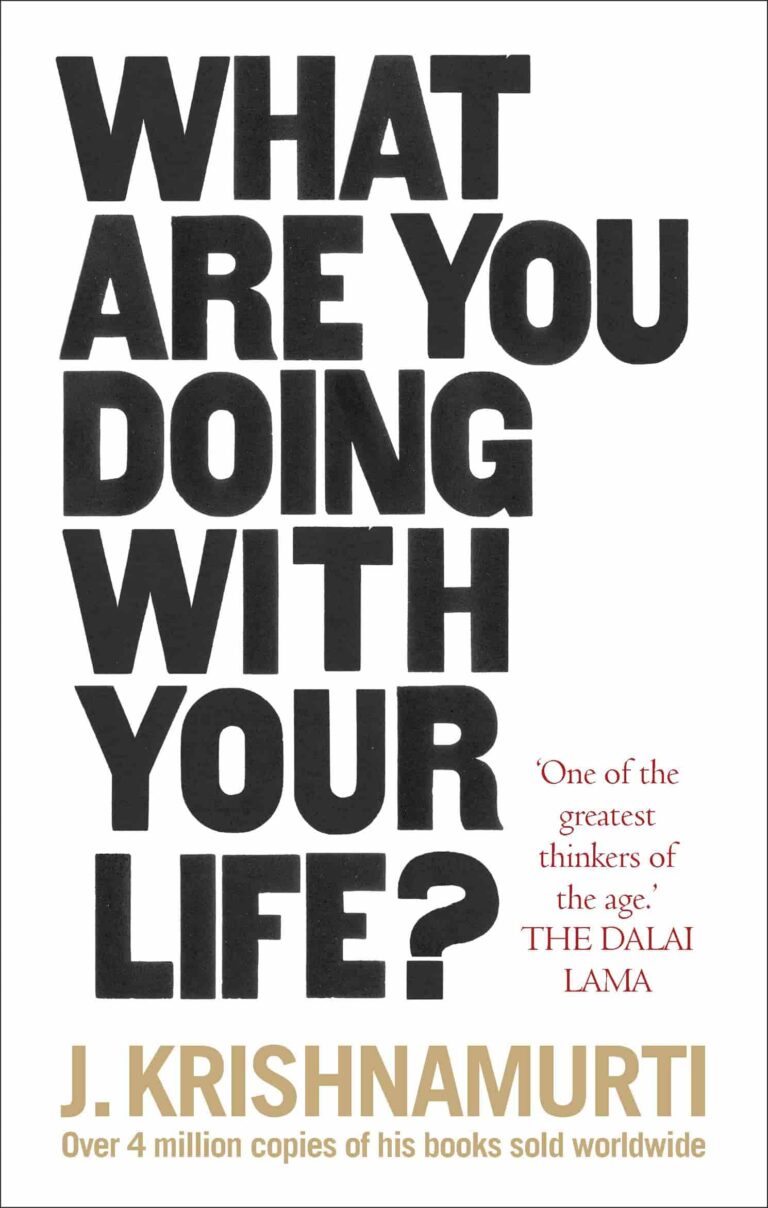What Are You Doing With Your Life? - J. Krishnamurti
Who am I?
What do I want to do with my time on earth?
How do I find meaning, happiness and love in life?
Sooner or later, most people ask themselves these existential questions.
J.K. explains in this work how your cultural conditioning narrows your worldview, why we don’t need revolutions or collective enlightenment, and why intelligence is more important than intellect.

Conditioning shrinks horizons.
It keeps us from seeing the world in its complex wholeness. It also makes us inflexible.
Instead of seeing life as changeable and constantly in flux, we imagine it as a rigid structure to further fit our worldview, our beliefs and values.
To see change in the world, your mind must move.
You must open your perception to the subtle, pervasive signs of change.
Otherwise, you will never see the big picture, but only your small and static slice of the picture.
All this leads to an uncomfortable conclusion:
If you want to see life truly, you must free yourself from all doctrines, from all the theories and systems that seek to explain the world in its entirety. This is the hardest part.
For suppose you conceive of yourself as a socialist or a capitalist, a Christian or a Hindu, then you try to reconcile even contradictory experiences with your beliefs.
But in doing so, your beliefs color your perceptions.
So how do you get back in tune with the world? By observing your mind.
Follow its movements like an attentive, external observer.
Develop a sense of where your conditioning narrows your vision.
This observation is the first step toward a truthful approach to yourself and the world.
Great ideologies and systems color our perceptions.
But that’s far from all: they also keep us from making the world a better place.
Too often, we wait for the world to improve through great revolutions or collective enlightenment.
But change doesn’t come from somewhere out there – it starts within ourselves.
Our world thrives on the interaction between individuals.
This is where our conflicts arise: at the individual level – not in politics, religion, or any other system.
The suffering of the world is not rooted in fascism, capitalism or fundamentalism.
It springs from the chaos of the human mind.
For Krishnamurti, all our problems begin with the self – from mental illness to economic inequality to wars. The concept of the “individual self” separates us from the rest of the world and sets us against each other.
This is because the isolated self strives for power and influence -and it is this striving that is at the root of all problems. The greed for individual advantage brings chaos into the world.
If you want to change the world, you must first disempower the self, that is, your ego.
However, you can’t do that by thinking hard. Rather, you must learn to observe your mind.
Develop an awareness of when your ego comes to the fore and influences your behavior in a destructive way.
Of course, thoughts can’t be turned down at the push of a button.
It takes practice to tame the mind. Again, the way is through mindful observation.
Realize that your intellect never knows the whole truth.
It represents your rational thinking, education and conditioning, so it only ever sees a slice of the picture.
According to Krishnamurti, you must take responsibility.
Free yourself from conditioning and stop attaching your happiness to external things.
Overcome your egoic self and send your cerebral intellect on vacation.
And forget the eternal search for meaning, because the meaning of life is life itself:
the incomprehensible miracle of your existence.
But how can this look concretely in everyday life?
Try this: the next time you have a strong opinion on any subject, pause.
Try to figure out why you have this opinion.
What role do your culture, privilege, and current situation play in this?
What would your opinion be if you were someone else? Are you perhaps even wrong?
These thoughts are already a first step towards leaving your ego behind.
